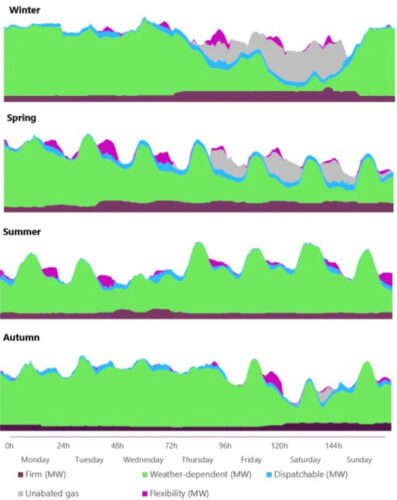[[{“value”:”
New report warns the UK faces blackouts, price rationing, and capacity gaps as demand surges and renewables fail to meet energy needs.
The Commons Public Accounts Committee (PAC) has expressed concern about the security of the nation’s electricity supply. [emphasis, links added]
Their report, ‘Energy Bills Support’, published last week, states:
The Department [for Energy Security and Net Zero] has more to do to convince Parliament that it has a robust plan for ensuring security of energy supply to meet increasing demand.
The security of the energy supply is the highest priority for the Department. Energy demand is set to rise from increasing numbers of electric vehicles and heat pumps, data processing centres, and the move to building homes.
The stability of the energy grid might be affected by the Department’s plans to move towards cleaner power by 2030, because intermittent renewable energy from wind and solar vary according to weather conditions.
Intermittent energy sources will therefore need to be complemented by flexible and baseload power.
Nuclear is an important low-carbon form of baseload generation but there are questions around the life and capacity of the existing plants and the time needed to get small modular nuclear reactors up and running.
In January 2025, the National Energy Systems Operator issued a routine notification to energy providers to increase supply after energy generation briefly fell below a margin set to make sure demand in the days ahead was met.
The Committee recommends that:
the Department should set out … how it will make sure there is capacity in the grid when there is low generation from renewable energy during periods of calm weather, including from wider technologies like nuclear.
The Committee has very good reasons to be concerned.
In November, NESO, the National Energy System Operator, published a report that looked into the implications of fully decarbonizing Britain’s electricity system by 2030 under Labour’s Clean Power 2030 programme.
The results were not pretty.
NESO emphasised that we would need to maintain our full existing fleet of gas power stations long after 2030, keeping them ticking over for the inevitable periods when the wind does not blow and the sun does not shine.
This alone drives a coach and horses through the whole idea of Net Zero.
The chart below shows the extent of the problem.
Modeled 7-day hourly generation profile in 2030 for Further Flex and Renewables

However, many of our gas plants are now more than 30 years old, and there is little attraction in keeping them open just to switch them on for an odd day here and there.
Many of these may not still be open in five or ten years. From a technical point of view, keeping them idling for weeks at a time creates problems as well.
In short, if Ed Miliband wants 30 GW of gas power plants on standby in 2030, he will have to pay through the nose for it.
He will also have to subsidise the construction of a large tranche of new gas-generating capacity.
The problem is that, as the PAC point out, demand for electricity is set to grow rapidly in coming years to power electric cars, heat pumps, data centres and industry. NESO reckon that peak demand could rise to 62 GW by 2030.
In January, when we came perilously close to blackouts, demand peaked at 48 GW, with gas power stations and interconnectors working flat out.
There could have been blackouts if one major generator or interconnector had gone down. It does not take a genius to work out that we will not have enough reliable, dispatchable generating capacity to meet the projected demand in 2030.
Miliband’s plan is, of course, to triple wind and solar capacity, but this will make little difference. After all, three times nothing is still nothing!
NESO recognizes this problem, and their solution is to drastically cut demand on the system when wind power drops away, sometimes by as much as 10 percent. This will either be done by price rationing or rolling blackouts.
This should not be acceptable in a supposedly advanced country.
Read rest at Conservative Woman
We give you energy news and help invest in energy projects too, click here to learn more
Crude Oil, LNG, Jet Fuel price quote
ENB Top News
ENB
Energy Dashboard
ENB Podcast
ENB Substack
The post The Climate Scaremongers: UK Grid Faces Serious Threats As Miliband Pushes Net Zero 2030 appeared first on Energy News Beat.
“}]]
Energy News Beat
